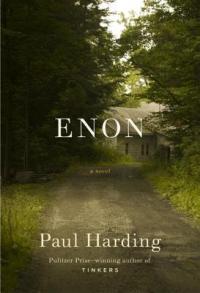Paul Harding’s Enon
 Enon
Enon
by Paul Harding
Random House, September 2013
256 pages / $26 Buy from Powell’s or Amazon
I am 17 when I first read Tinkers. I have only a few weeks left before I graduate high school, before I move off to college, before I become whatever I am going to be. And then I read Tinkers—quite by accident—and I decide that I will major in English. I read Tinkers all the way through in the Starbucks in the Barnes & Noble where I pick it up. It is glorious.All this to say: if there is an ideal reader for Enon, Paul Harding’s new novel, it is me. So let me tell it to you straight, as one who is predisposed to love this book, to love anything Harding touches: Enon is a good book. It is also wholly unremarkable.
It is the curse of a lauded artist that one great work might overshadow other good—but somehow lesser—works. Such is Harding’s fate.
Enon is the psychological investigation of a man, Charlie Crosby, who loses his daughter to a car crash and his wife to a divorce within the span of a few weeks. In its best moments, Enon lifts the reader out of herself and places her into a grand cosmos of lyrical, emotional language—a cosmos that emerges out of nothing, like a grand planetarium when the lights are off and the stars seem as if they are just within the reach of our miniscule human fingers. These moments are transcendent; but they are also, unfortunately, merely moments. When they end, the lights of the planetarium come up and we see once more the wires connected to the planets, the projectors creating the images of stars. The veil is lifted and the magic is lost.
Which is not to say that these other moments—the majority of the book—are bad. They are, rather, merely flaccid. Harding has a great handle on the oscillation between this elegant lyricism and what Mary Oliver has called “cold language,” the humdrum language of the banal. But it seems to me that too often his humdrum language is a bit too hum. In the hands of another Pulitzer-winning novelist—Michael Chabon, say, or Richard Russo—this oscillation between the lyric and expository modes would be less noticeable, both because Chabon and Russo have a better grasp on the banal, and because their lyric abilities don’t come close to Harding’s. But Chabon—and, to a lesser degree, Russo—have something that Harding does not: an impulse towards plot.
That Enon is a plotless novel is no offense; that it is a motionless one, however, is. There is the vague silhouette of an emotional journey, but it exists only as suggestion. It merely imitates the sounds and shapes of a journey without the heft and emotional bulk of one. Take this paragraph, for instance, which is simultaneously a perfect outline of the entire “plot” of the novel (“spoiler alert” doesn’t even begin to be a salient concept in the realm of this novel); an example of Harding’s enchanting, lyrical, winding sentences; and a perfect encapsulation of the type of shading-without-substance narrative Enon trades in:
October 7th, 2013 / 11:00 am
